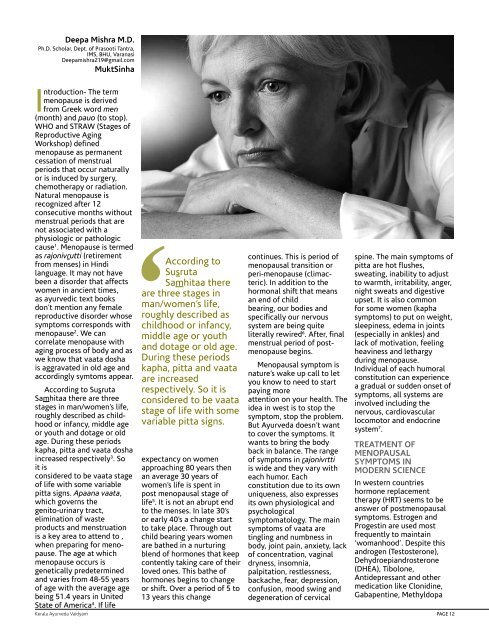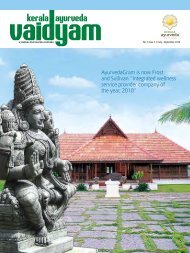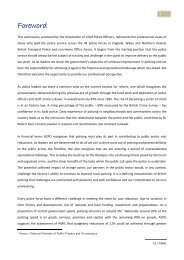Create successful ePaper yourself
Turn your PDF publications into a flip-book with our unique Google optimized e-Paper software.
Deepa Mishra M.D.<br />
Ph.D. Scholar, Dept. of Prasooti Tantra,<br />
IMS, BHU, Varanasi<br />
Deepamishra219@gmail.com<br />
MuktSinha<br />
Introduction- The term<br />
menopause is derived<br />
from Greek word men<br />
(month) and pauo (to stop).<br />
WHO and STRAW (Stages of<br />
Reproductive Aging<br />
Workshop) defined<br />
menopause as permanent<br />
cessation of menstrual<br />
periods that occur naturally<br />
or is induced by surgery,<br />
chemotherapy or radiation.<br />
Natural menopause is<br />
recognized after 12<br />
consecutive months without<br />
menstrual periods that are<br />
not associated with a<br />
physiologic or pathologic<br />
cause 1 . Menopause is termed<br />
as rajonivrutti (retirement<br />
from menses) in Hindi<br />
language. It may not have<br />
been a disorder that affects<br />
women in ancient times,<br />
as ayurvedic text books<br />
don’t mention any female<br />
reproductive disorder whose<br />
symptoms corresponds with<br />
menopause 2 . We can<br />
correlate menopause with<br />
aging process of body and as<br />
we know that vaata dosha<br />
is aggravated in old age and<br />
accordingly symtoms appear.<br />
According to Susruta<br />
Samhitaa there are three<br />
stages in man/women’s life,<br />
roughly described as childhood<br />
or infancy, middle age<br />
or youth and dotage or old<br />
age. During these periods<br />
kapha, pitta and vaata dosha<br />
increased respectively3 . So<br />
it is<br />
considered to be vaata stage<br />
of life with some variable<br />
pitta signs. Apaana vaata,<br />
which governs the<br />
genito-urinary tract,<br />
elimination of waste<br />
products and menstruation<br />
is a key area to attend to ,<br />
when preparing for menopause.<br />
The age at which<br />
menopause occurs is<br />
genetically predetermined<br />
and varies from 48-55 years<br />
of age with the average age<br />
being 51.4 years in United<br />
State of America4 . If life<br />
<strong>Kerala</strong> <strong>Ayurveda</strong> <strong>Vaidyam</strong><br />
According to<br />
Susruta<br />
Samhitaa there<br />
are three stages in<br />
man/women’s life,<br />
roughly described as<br />
childhood or infancy,<br />
middle age or youth<br />
and dotage or old age.<br />
During these periods<br />
kapha, pitta and vaata<br />
are increased<br />
respectively. So it is<br />
considered to be vaata<br />
stage of life with some<br />
variable pitta signs.<br />
expectancy on women<br />
approaching 80 years then<br />
an average 30 years of<br />
women’s life is spent in<br />
post menopausal stage of<br />
life 5 . It is not an abrupt end<br />
to the menses. In late 30’s<br />
or early 40’s a change start<br />
to take place. Through out<br />
child bearing years women<br />
are bathed in a nurturing<br />
blend of hormones that keep<br />
contently taking care of their<br />
loved ones. This bathe of<br />
hormones begins to change<br />
or shift. Over a period of 5 to<br />
13 years this change<br />
continues. This is period of<br />
menopausal transition or<br />
peri-menopause (climacteric).<br />
In addition to the<br />
hormonal shift that means<br />
an end of child<br />
bearing, our bodies and<br />
specifically our nervous<br />
system are being quite<br />
literally rewired 6 . After, final<br />
menstrual period of post-<br />
menopause begins.<br />
Menopausal symptom is<br />
nature’s wake up call to let<br />
you know to need to start<br />
paying more<br />
attention on your health. The<br />
idea in west is to stop the<br />
symptom, stop the problem.<br />
But <strong>Ayurveda</strong> doesn’t want<br />
to cover the symptoms. It<br />
wants to bring the body<br />
back in balance. The range<br />
of symptoms in rajonivrtti<br />
is wide and they vary with<br />
each humor. Each<br />
constitution due to its own<br />
uniqueness, also expresses<br />
its own physiological and<br />
psychological<br />
symptomatology. The main<br />
symptoms of vaata are<br />
tingling and numbness in<br />
body, joint pain, anxiety, lack<br />
of concentration, vaginal<br />
dryness, insomnia,<br />
palpitation, restlessness,<br />
backache, fear, depression,<br />
confusion, mood swing and<br />
degeneration of cervical<br />
spine. The main symptoms of<br />
pitta are hot flushes,<br />
sweating, inability to adjust<br />
to warmth, irritability, anger,<br />
night sweats and digestive<br />
upset. It is also common<br />
for some women (kapha<br />
symptoms) to put on weight,<br />
sleepiness, edema in joints<br />
(especially in ankles) and<br />
lack of motivation, feeling<br />
heaviness and lethargy<br />
during menopause.<br />
Individual of each humoral<br />
constitution can experience<br />
a gradual or sudden onset of<br />
symptoms, all systems are<br />
involved including the<br />
nervous, cardiovascular<br />
locomotor and endocrine<br />
system 7 .<br />
TREATMENT OF<br />
MENOPAUSAL<br />
SYMPTOMS IN<br />
MODERN SCIENCE<br />
In western countries<br />
hormone replacement<br />
therapy (HRT) seems to be<br />
answer of postmenopausal<br />
symptoms. Estrogen and<br />
Progestin are used most<br />
frequently to maintain<br />
‘womanhood’. Despite this<br />
androgen (Testosterone),<br />
Dehydroepiandrosterone<br />
(DHEA), Tibolone,<br />
Antidepressant and other<br />
medication like Clonidine,<br />
Gabapentine, Methyldopa<br />
PAGE 12




